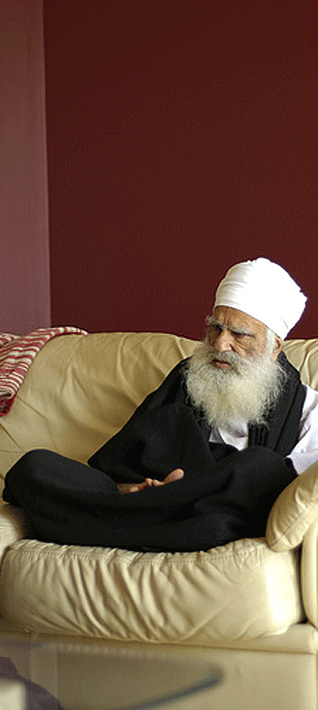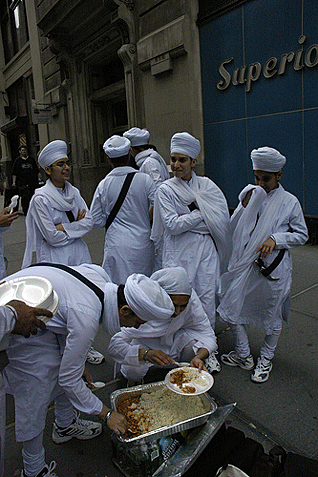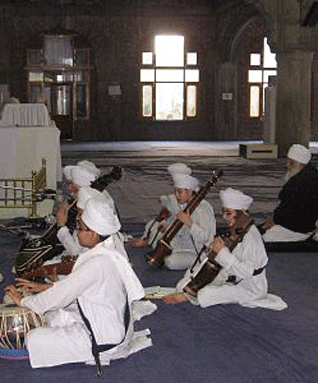
Baba
Iqbal
Singh
Photo above: Courtesy - Gurvinderpal Singh

Students-Baru
Sahib

The
Ambrosial
Hour

Baru
Sahib
Complex
Columnists
School of Learning
by GURUMUSTUK SINGH KHALSA
The other day, Baba Iqbal Singh of the Kalgidhar Society, Baru Sahib (India), visited us here in Espanola, New Mexico (U.S.A.), along with four young female students and a few other associates who tour with him.
To this point, I had heard the names "Baru Sahib" and "Akal Academy", but knew very little about the organization and what their schools were like.
Before Baba Iqbal Singh arrived, I was talking with someone else in the room who was telling me about the school and how boys and girls dressed exactly the same (not being able to tell if the person is a girl or boy). I also heard that there were no mirrors in the whole school (I think to prevent vanity/ego/self consciousness). I wondered how they tied their own turbans.
Then later on, Babaji told us about the school and how the senior children start their morning at 12:30 am and finished their amritvela sadhana at 4:30 am! He went on to describe how the children were very well behaved and obedient and that many of the graduates of the school have achieved a lot in life.
He painted a picture that appeared too good to be true, almost as if it was a sales pitch of all the positive things. I couldn't imagine kids this way. In my mind, I started wondering if the kids were happy there, or if they felt repressed or forced by their parents to become the "perfect" Sikh. (Keep in mind, these thoughts were not based on any real experience; only on a few things I had heard about the school and from talking with two students for a few minutes).
I remember going to boarding school in India and being punished harshly if I was late for gurdwara or didn't wake up for morning sadhana. It wasn't a positive experience for me and many others. (Though, I turned out okay, didn't I?) Maybe this was why I was thinking about the school in this way.
In relation to the school program, it was interesting to see the thoughts that came into my head. I started to think critically about some of the things and how extreme/strict the school sounded in some areas. I thought about how a school like this probably wouldn't be possible in Western countries, because of the cultural differences and less obedience.
I remember when I went to boarding school in India (1983-1993), all of us "Western" kids were the biggest troublemakers. Most of the local kids did as they were told, but it was the opposite with us. Being raised in America was a huge cultural difference. It was natural for us to question authority, and "stand up for our rights". This created a very different atmosphere for the teachers and the school to deal with.
Anyway, my point of bringing this up is not to poke at Akal Academy or look for fault. During the course of the day, I started evaluating why I was thinking certain things and soon realized that this was exactly how other people react to "3HO" or the so-called "American Sikhs"/yoga/Yogi Bhajan.
It normally starts with someone knowing little (or nothing) about us, and then hearing some tidbit of information from someone, and then a critical judgment follows. I think another factor is that when someone appears to be doing something good (especially in the religious world), people are often critical of them (especially if they are doing something more disciplined then themselves).
I was surprised to watch my thoughts being critical without any real reason or much interaction with these people. The main issue was that I perceived them as doing something different than my experience as the "correct way".
To me this is the crux of all the criticizing and judging (especially in the Sikh communities!). Everyone has his/her own understanding and opinion about how something should be done and what is right and wrong. Many of us are raised and taught differently. I consider myself very open-minded, so I was a bit surprised by my initial feelings and wanted to delve deeper into what was triggering these thoughts. The positive thing is that I was conscious of this and felt like I was watching my thoughts on television, and able to evaluate why I felt this way.
Lunch with Baba Iqbal Singh and guests was a very formal meeting, and during lunch, many of us talked about our background, and people from the different local Sikh companies and organizations shared information about what they do.
The evening was the real opening for me as we had a cozy get-together with the guests and sangat at someone's house.
We started with some kirtan celebrating Guru Gobind Singh's birthday and then, when the guests arrived, the Akal Academy Girls' Jatha played some beautiful kirtan. It was inspiring to see them playing together with the same type of stringed instruments that were used by some of the Gurus and Bhai Mardana. Their voices were so strong and powerful as they sang four different shabads.
Charanjeet and I were sitting right up front and her eyes were fixed on them, as she had never heard anything like this. Baba Iqbal Singh ended each shabad summarizing the meaning. Before we had dinner, Avtar Hari Singh gave a nice slide show presentation about the Kalgidhar Society. It gave us an overview of all the different work that this organization does, its goals, as well as the impact on the students of the schools that are now prevalent in Punjab.
After getting to know them better and processing why I was thinking this way, I was able to see them for who they are (without clouds of doubt and judgment). It was impressive to see the extent of work that they do in India. I am thankful that they took the time to come and visit us so we could learn about this organization and form bonds of unity.
Next time I go to India, I would like to visit one of the schools to experience it for myself.
My point of writing all this is to share how easy it is to quickly criticize and judge people who you know little about, or just because they do something different than you. In our community, there are instances of intolerance for people that do things differently. People judge those who cut their hair, don't do this...or that....or do something "wrong", in their opinion.
I've always thought of Sikhi being more of a lifestyle and way of life, than a religion. You can follow the path that the Gurus laid out and you'll reach a certain promised goal. I think of the Sikh lifestyle as a set of tools which guide you quickly along on your spiritual journey.
However, this is less the case these days. Instead, the Sikh lifestyle is being practiced more like an intellectual thing and book of rules and regulations that everyone feels compelled to enforce, based on their opinion, as if they are the "Sikh Police".
What happened to the sweetness that Mata Sahib Kaur gave to the Khalsa by putting the sugar in the water of the first Amrit Sanchar? It seems that everyone is fighting, and out to get one another.
Every day, when we do Ardas and bless the parshad, we instill the strength of steel as the kirpan goes through it; and, as we taste it, we are supposed to remember the sweetness of this path and bring this sweetness to our lives and those around us.
Sikhs cannot be the protectors and leaders of the world if they lose this sweetness and are always fighting. It needs a fine balance.
I had a friend visit from England recently and, after a few days, we both realized many major differences in how we practiced some things related to Sikhi. Overall, the core practices were the same, but there were some things which were different and conflicting. It was interesting learning from each other. We were both open-minded, so it was fine.
Many of the practices, in my opinion, seemed a bit extreme and I didn't agree with them. However, I understood that this was how she was raised and learned Sikhi, and this worked for her. In the same way, I have learned and experienced Sikhi in different ways myself (which other people might not agree with either).
In the end, neither of us was right or wrong. What counts is that we are on this path working on ourselves to become better people.
There are so many different people from various backgrounds and any one way isn't the only way (otherwise there would not be so many religions and spiritual paths). Sikhi is such a beautiful path and lifestyle to follow. It seems somewhere along the way (maybe when the British took over India), Sikhi started being practiced like a rulebook, and the guilt complex came in with judgment/heaven/hell/guilt.
Even some of the English translations of the Guru Granth Sahib reflect this with the way that it is translated.
It's no wonder so many are no longer practicing this beautiful Sikh lifestyle, when at every turn they are judged and criticized.
When an outsider reads about Sikhi, it all sounds so beautiful, but in practice we as a whole, worldwide community have a long way to go to get back on the path that the Gurus left for us. When people think of Sikhs, they should think of kindness, courage, strength, honesty, nobility, and most of all ACCEPTANCE!
So much of what Guru Nanak taught was about breaking down the barriers of differences and showing that we are all One. He taught a message of acceptance, equality, oneness, and yet this practice is largely ignored. We could probably argue about the definition of a Sikh and say that someone who cuts their hair is not a Sikh.
While this is not the full path that was taught by our Gurus, who are we to judge whether someone else is a Sikh or not? That is a very personal thing between an individual and his or her Guru. We all go through our ups and downs in life, which hopefully teach us lessons and bring us closer to this Oneness/God.
Too often, we focus on these outward things and try to find differences and divide rather than find similarity (black, white, brown, sehajdhari, amritdhari, this Sikh, that Sikh, good Sikh, bad Sikh). If you are amritdhari and don't do your banis one day...or miss something, automatically the norm is guilt for many.
I look at this lifestyle as a set of tools that you practice to get certain benefits and reach a certain goal. A good story to illustrate this is the story of Guru Gobind Singh and the Goldsmith.
You might exercise to stay healthy. If you commit to exercising every day and miss a day, I would hope that you wouldn't beat yourself up about it. You simply failed to get the benefit from that "tool" that day, and will get back to doing the exercise the next day. Right?
I'm not trying to make light of the commitment to our Guru when taking Amrit, but just trying to show how guilt and criticism take away from this experience of being a Sikh and how it is a personal thing that you work on every day.
I live this way because it makes me feel good and connects me with a higher self. I don't do it out of guilt or obligation. We are not perfect beings and it takes work on a daily basis. As long as you keep trying and working on guiding yourself back to this path, when you "stumble off", then you are fine.
To summarize, I'll try to make a few points.
1 If we are more conscious of our thoughts and our mind, it is easier to make a change and be open to other people and differences. To see the oneness and sameness in each and every person, in spite of any perceived differences. The first step to breaking a habit is to be aware of it and conscious when you are doing it.
2 Just because someone practices or does something differently than you doesn't make the other person's way wrong or incorrect. We all relate to things based on our own experience and what is right for me isn't necessarily right for someone else.
3 Don't judge or criticize people (as hard as that may be, since it is human nature to do so). Instead, use this energy to work on yourself and become a better person. None of us are perfect. Each of us have more than enough things to work on in our own life.
January 8, 2008
[Courtesy: MrSikhNet.com]
Conversation about this article
1: H. Singh (Chicago, Illinois, U.S.A.), January 08, 2008, 6:53 PM.
I apreciate your comments and some of the points are quite valid. Yoga might be a personal lifestyle practice for people. However, 3HO associates believe that Gurus did Kundalini Yoga and that such practices are in accordance with Gurbani, which is not true at all. It is not correct to defend yogic practices by using Sikhi. I don't think this is "criticizing" or "cultural difference", as you put it. It is not fair to compare the practice of yoga practice with the work being done at Baru Sahib.
2: Ruby Kaur (Oxford, England), January 08, 2008, 10:10 PM.
A wonderful article that has articulated my feelings and experiences very well. In some contexts, Sikhi has become a rigid, dogmatic creed that asphyxiates many who follow it. I feel much of this has to do with a closing of the Sikh mind in the face of modernity, and the strictures and intolerance caused by a conflation of religion and politics. In many ways, I see Sikhi following a similar trajectory as Islam has in the modern world.
3: R. Sandhu (Brampton, Canada), January 09, 2008, 9:28 AM.
Sikhs were given the democratic collective, and directed to take the lead from the Guru Granth to chart the future of the community, and were given the means to effect change, in order to remain viable in a fast, ever-changing world. However, the message is getting buried in the din of latter-day, self-appointed "messengers". The Word of the Guru is the Guru Granth. Now we have everybody claiming to be the voice of The Guru and promoter of the way. The individual's communion with the Guru has been eliminated in favour of new-age "techniques", sadhnas and dogmas, and the very overt and empty display of "better-than-thou" form of religiousity, the very kind Guru Baba Nanak raised his voice against in the first place.
4: Prabhu Singh Khalsa (Española, New Mexico, U.S.A.), January 09, 2008, 5:11 PM.
It's sad that people like H. Singh are so unaware of Gurbani and try to use it as a weapon to put down the practices of others. Besides, Baba Iqbal Singh Ji of Baru Sahib is a very regular practitioner of yoga. My friends who are close with him have described several aasans (postures) and pranayams (breath techniques) and kriyas that he practices daily. Read the Siri Guru Granth Sahib, Guru Nanak clearly states: "The Gurmukh practices Yoga" (ang 907) Also Guru Arjan Dev clearly says: "I came to the Guru, to learn the Way of Yoga." (ang 208) Guru Amar Das says: "Sitting in Yogic postures in the City of God, through the Word of the Guru's Shabad, you shall find Yoga." (ang 909) (Here the word "aasan" is translated as yogic posture, which is a very appropriate translation. My question to those detractors and ignorant people who know nothing of yoga is: How can you follow Guru Ji's instruction in this line of Gurbani, without understanding even one aasan?) "The Gurmukh realizes the way of yoga." (ang 946) Perhaps the Guru's strongest endorsement for our way of life, comes from Guru Arjan Dev: "Through the Word of the Guru's Shabad, conquer and subdue your mind; take the support of Yoga." (ang 993) I will never figure out why people will call themselves Sikh and ignore the importance of yoga. Sikhi is a path of yoga/jog/union with the infinite. Read what the Guru says about Raj yoga, see that Guru Ram Das holds the eternal throne (takht) of Raj Jog. Learn some kriyas or aasans or pranayams, use the support of yoga and then read Gurbani. You might understand things better. It's not an intellectual debate. Only the experience will teach you. It's not a mistake that thousands of westerners have come to the feet of the Guru through the practice of Kundalini yoga, the yoga of awareness.
5: Satvir Kaur (Boston, U.S.A.), January 10, 2008, 8:57 AM.
I agree with Gurumustuk Singh in that we shouldn't criticize others if they do things differently. But I also agree with H. Singh because whenever I read about 3HO, all I get is that yoga is the only way. I'm not saying that it's the wrong way. Prabhu Singh gave examples of how the Gurus practiced yoga. How is it necessary for understanding Gurbani, which is at the heart of Sikhi?
6: Amarjot Singh (Milwaukee, Wisconsin, U.S.A.), January 10, 2008, 3:14 PM.
Thank you for sharing this, Gurumustuk Singh. It is sad that we jump to conclusions before we get to know about something. Maybe that is why the word "Guru" is so important in our lives. Gu = darkness, Roo = light. The Guru gives us the ability and the opportunity to see in light and, with His blessings, we are able to recognize and conquer our ego and then open ourselves to learn from anything and everything this Universe has to offer. Isn't that the true meaning of Sikh; the one who has grounded his/her ego and has opened to learn the creator through its creation. That, I believe is the teaching of Guru Nanak and reflected in our Guru Granth. Yet again and again, we keep pre-judging. Thank you, Prabhu, for sharing the hymns from the Gurus, and throwing light on the issue.
7: H. Singh (U.S.A.), January 11, 2008, 4:48 PM.
Prabhu, Yoga is not raising Kundalini, Yoga is about hearing the Shabad. It is the Yoga of the Gurmukh. The verses you posted don't mean what you may intend to mean. It is same way as the Hindu-fundamentalist RSS claims that Gurbani tells us to worship Krishan, Shiva, or Ram. This is the Yoga of the Gurmukh: Through the Shabad, he understands his own soul, and he enshrines within his heart the One Lord. [Guru Granth, page 908, Line 4.] The Gurmukh practices Yoga - he is the true hermit; he practices abstinence and truth, and contemplates the Shabad. Page 908, Line 5. One who dies in the Shabad and conquers his mind is the true hermit; he understands the Way of Yoga. ||21|| Meeting with the Holy, the perfection of the Siddhas is obtained. What good is Yoga or indulgence in pleasures? Page 335, Line 9. Sew this body as your patched coat, and take the Lord's Name as your support. ||1|| Practice such Yoga, O Yogi. Page 970, Line 15. Attuned to the Naam, they contemplate the Way of Yoga. Page 941, Line 15. The Yogis wander in the twelve schools of Yoga; the Sannyaasis in six and four. One who remains dead while yet alive, through the Word of the Guru's Shabad, finds the door of liberation. Page 941, Line 19.
8: A. Kaur (U.S.A.), January 13, 2008, 9:27 AM.
I think people like me are still ego-focused beings and have not reached higher spiritual stages, and therefore are prone to being judgmental. To reach those loftier levels, Guru Granth Sahib is the guide, the Guru. Depending on the individual's person spiritual stage/mindset, that person can easily get a different message reading the very same line. Especially if we read just a line out of context. There is the famous fable of a group of blind or blindfolded people trying to describe an elephant, and arriving at completely ifferent conclusion, each based on a different perspective. The main emphasis, it appears to me, should be on Naam (the name of God), service and leading a truthful life (the three basic tenets of Sikhi). I guess our own life is the best feedback, if we are moving towards divine love, bliss, humility and a life of seva ... then, we should be on the right path.
9: Prabhu Singh Khalsa (Española, New Mexico, U.S.A.), January 14, 2008, 7:00 PM.
H. Singh Ji, I have certainly read these passages. The Guru is describing true yoga. He addresses it to yogis. I don't have any confusion as to the meaning of this. Yoga is nothing like the RSS. Yoga is about union, RSS is about division. Hindu is not a religion: it is a collection of religious cultures from India. These attacks and divisions are ridiculous. Therefore, it shows insecurity on our part to think that the Guru's teachings can be dilluted by those who try to divide and confuse. Gurbani tells us to worship the One God, and it clearly demonstrates that the name for God is not of great importance. I don't wish to debate. I no longer have the desire to discuss matters of yoga with people who are not yogis. As a Sikh I practice yoga as described by my Guru. I don't have any confusion or insecurity about my path. Despite my own yogic practice, every Sikh practices Karma Yoga (seva) and Naad Yoga (union through sound current, i.e. Gurbani). As far as I can tell the whole path of a Sikh brings yoga/union and every true Sikh is a true yogi.
10: Gurdip Singh Chana (London, United Kingdom), January 19, 2008, 4:37 PM.
H. Singh and Prabhu Singh have both made some interesting submissions. As I am unsure of the 'mysteries' of yoga, I am in no way, shape or form in a position to criticize it. However, I see yoga as a scientific tool, a means by which the body can be exercised and the mind can be relaxed; ultimately as yet another tool to facilitate communication with God. However, I do not feel that yoga is central or even remotely fundamental for Sikhs. As Prabhu Singh put it, yogic activities include meditation, self-discipline, etc. I consider yoga as a useful tool to achieve peace of mind and body, but I shall leave this as somewhat an inconclusive argument on the basis that: Sikhi is a universal path, follow it whatever way is necessary for your personal gain, but do avoid the pitfalls spelled out so cleary in Gurbani. Want to be a true Sikh, H.Singh or Prabhu Singh? then don't make me state the obvious and just look for your answers in Guru Ji. Sikhi is not a religion, it is a way of life, aimed at the individual, not the masses; thus, follow what the Guru advises YOU, the individual. It is good to debate these points; but as Gurumustuk Singh says, do not put someone else's beliefs down while pursuing your own path.


